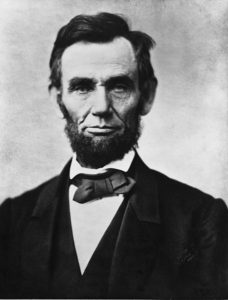
Abraham Lincoln represented a slave owner once in his career. We wonder if he really believed in this case or not. (Flickr / Creative Commons / Believe Creative)
The Matson Trial was a significant case in the life and career of Abraham Lincoln, but for a reason one would not expect. The man who would later emancipate the slaves defended a slave owner in the Matson Trial. This does not necessarily mean that he believed in slavery, but it is an interesting irony that he defended someone who owned slaves before freeing the slaves.
Robert Matson owned slaves in the free state of Illinois. Illinois was not a slave state. He was operating on an exception to the rule by keeping slaves for one year and sending them off. He emancipated one of his slaves, Anthony Bryant, who became his foreman. Bryant’s family would later join him in Illinois. During this time, there was an altercation between a white housekeeper and Bryant’s wife. As a result, Matson sent one of Bryant’s kids back to Kentucky. Consequently, Bryant was worried about his family, so he sought help from two abolitionists, Hiram Rutherford and Gideon Ashmore. The rest of his family was still enslaved, and this was illegal under the Illinois law.
Lincoln was actually asked by Rutherford and Ashmore to represent Bryant, but he was already representing Matson. Illinois Attorney General Usher F. Linder was defending Matson as well. Linder gave Lincoln permission to represent the abolitionists instead, but Rutherford refused Lincoln’s help. The abolitionists had former U.S. representative Orlando B. Ficklin defend Bryant.
Abraham Lincoln defended Matson by saying that he was protected because the slaves were in transit. But the Bryants were there at Matson’s for two years. So, his defense didn’t hold up, and Lincoln lost the case.
There are many reasons why Lincoln could have taken the case. It could have been that he was in financial trouble and needed the money. It could have been that he knew from the beginning he would lose the case. It could have also been that he believed Matson was within his rights.
As we look back on the Matson Trial, there are a couple of things that come to mind. A lawyer doesn’t necessarily believe in the position he is asked to take by his client. A client under our system of government is entitled to a lawyer, regardless of whether the position the client has in a case is a popular one. Lincoln may not have been sympathetic with Bryant but it was his job to represent clients who needed help. It is also probable that Lincoln’s attitudes about slavery were continuing to form in 1847. It may be that being on the wrong side of this case, which he lost, showed him the error of not only his client’s position, but in his advocacy on behalf of his client.
See our blog about Lincoln’s head injury.

